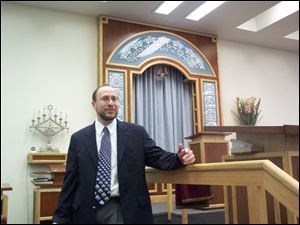
Journalists have chance to feast on information
7/17/2004
Rabbi Benjamin Samuels says Shaarel Tefilah, a synagogue in Newton, Mass., is a 'modern Orthodox' congregation.
BOSTON - In September, 1654, a boat carrying 23 Jews who had fled persecution in Pernambuco, Brazil, sailed into the harbor of New Amsterdam, now New York City, intent on starting a new life in the New World.
The settlers ran into opposition immediately, however, as Governor Peter Stuyvesant, a member of the Dutch Reformed Church, tried to kick them out, arguing that if he let the Jews in, he'd also have to let "the Lutherans and Papists" into the colony.
The Jews refused to leave and appealed to the Dutch West India Company, which ruled the colony in those days and in which the settlers had invested a significant amount of money.
The firm vetoed Governor Stuyvesant, granting the Jews the right to settle, and this year American Jews are celebrating the 350th anniversary of the first Jewish settlement in North America.
This fascinating piece of American Jewish history, explained by author and professor Jonathan Sarna of Brandeis University, was among a myriad topics discussed this week at the 2004 Gralla Fellowship Program for Religion Journalists.
The four-day session, which included 21 lectures, seminars, and round-table discussions, is held semiannually under the auspices of the Near Eastern and Judaic Studies Department at Brandeis University in Waltham, Mass., a suburb of Boston.
Journalists are curious by nature, if not outright information junkies.
We read everything we can and then cram articles, studies, reports, surveys, books, magazines, and business cards into our file cabinets, shelves, and Rolodexes just in case we may need them someday.
Often the papers just collect dust, but it's reassuring to know the information is there when and if we ever need to report on the subject.
As one of 20 Gralla Fellows selected from print and electronic media outlets throughout the country, I had the rare opportunity to soak up a wealth of information taught by some of the leading experts in the field, including scholars, authors, rabbis, educators, and journalists.
The program, now in its seventh year, is intended to help religion journalists better understand this relatively small but vital religious and ethnic group that accounts for about 2 percent of the American population.
Session topics included Jewish-Muslim relations; Jewish-Christian relations; America and Israel; Jewish texts from Sinai onward; Jewish education; Jewish medical ethics; Inside the world of Chabad-Lubavitch; Can a religion journalist be religious, and how to cover sensitive religion stories (taught by Michael Paulson, the Pulitzer Prize-winning religion reporter for the Boston Globe).
One of the more colorful talks was given by Milton Gralla, a philanthropist whose financial support made this program possible.
Mr. Gralla is a New York-born son of immigrants who built a trade-magazine publishing empire with his brother.
The siblings started with a single issue of Kitchen Business Magazine in 1955, and eventually published 19 mag-azines that they sold in 1983 for $72
million.
Newspaper ink still runsin Mr. Gralla's veins, and the tough-talking journalist talked about how, as a rookie sports reporter manning the phones one night at the Tulsa (Okla.) World, he was taking scores from Class C minor league baseball games when a rather unusual call came in.
A stringer from Topeka routinely reported the hits, runs, errors, winning pitcher, home runs, and the like, and as an afterthought, added: "The game was delayed 45 minutes because of a fire in the center field stands."
Mr. Gralla's eyes popped open.
He asked the caller for a little more information about the fire, and the cub reporter ended up getting his first hot scoop.
"You've got to have a keen sense of smell, a nose for news," he advised the Gralla Fellows.
The diversity of American Judaism was seen firsthand on a visit to Congregation Shaarei Tefilah in Newton, Mass. Like all Orthodox synagogues, it has a divider separating men and women worshippers.
But unlike the vast majority of Orthodox Jewish congregations, women are invited to give sermons and serve as officers on the board.
Rabbi Benjamin Samuels describes Shaarei Tefilah as a "modern Orthodox" congregation.
Rabbi Meier Sendor of Sharon, Mass., spoke on Jewish spirituality, including mysticism and the Kabbalah, a form of discipline and study that seeks to bring the practitioner closer to God.
After a lifetime of studying the Kabbalah, the rabbi could only shake his head and smile at the way the mystical branch of Judaism has become entertainment news because of Madonna's visits to the Kabbalah Centre in Los Angeles.
"I think the 13th century rabbis who taught the Kabbalah would not roll over in their graves, but have a big belly laugh" over the way a pop culture icon and the Kabbalah have intersected, Rabbi Sendor said.
The Kabbalah story reminds me of religion reporting. Some journalists look at the surface of the issues just like some celebrities tinker with the Kabbalah.
But those who take it seriously and look for depth, know they can spend a lifetime studying the issues and still not know it all.
Programs like the Gralla Fellowship help serious journalists climb one step higher in their understanding and, armed with more knowledge - and a nose for news - do a better job of keeping the public informed about complex, crucial, and timely issues
David Yonke is The Blade's religion editor.
Contact him at 419-724-6154 or dyonke@theblade.com.